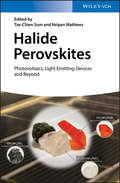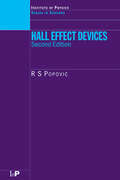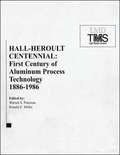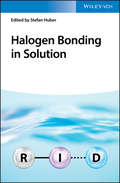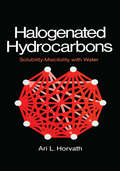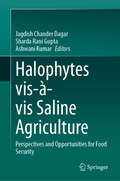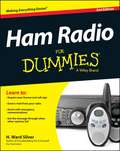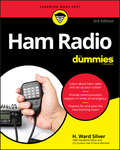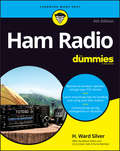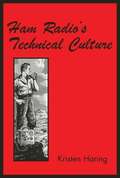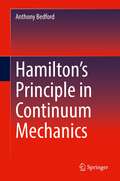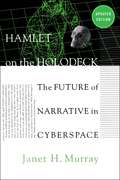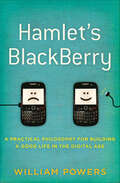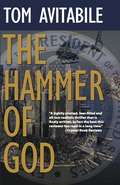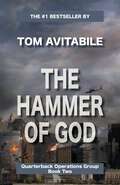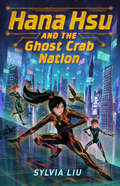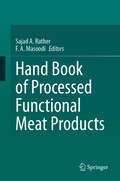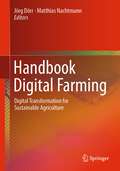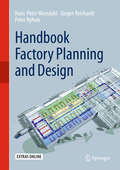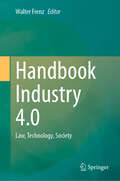- Table View
- List View
Halide Perovskites: Photovoltaics, Light Emitting Devices, and Beyond
by Nripan Mathews Tze-Chien SumReal insight from leading experts in the field into the causes of the unique photovoltaic performance of perovskite solar cells, describing the fundamentals of perovskite materials and device architectures. The authors cover materials research and development, device fabrication and engineering methodologies, as well as current knowledge extending beyond perovskite photovoltaics, such as the novel spin physics and multiferroic properties of this family of materials. Aimed at a better and clearer understanding of the latest developments in the hybrid perovskite field, this is a must-have for material scientists, chemists, physicists and engineers entering or already working in this booming field.
Hall Effect Devices (Series in Sensors)
by R.S. PopovicThis is the second edition of a very popular 1991 book describing the physics and technology of semiconductor electronic devices exploiting the Hall effect. These are magnetic field sensitive devices such as Hall elements, magnetoresistors, and magnetotransistors. Hall effect devices are commonly used as magnetic field sensors and as means for char
Hall-Heroult Centennial: First Century of Aluminum Process Technology, 1886 - 1986
by Ronald E. Miller Warren S. PetersonA rich collection of insightful papers and photos gathered from the world's top aluminum companies highlight the important developments in the process metallurgy of aluminum from 1886-1986, including the electrolytic method of making aluminum, emission and waste control measures in plant operations, manufacture of carbon electrodes, methods of processing bauxite and alumina, technology for melting and casting process ingots, and processes for reclamation and recycling. Following the growth of the aluminum industry from infant to giant, this book features insight into the lives of Charles Hall and Paul HTroult, who devised a method of aluminum production that would revolutionize the industry, as well as descriptions of developments in technology, equipment, and practice in the various areas of aluminum process metallurgy.
Halo Encyclopedia
by MicrosoftIn the 26th century, humanity relentlessly continues their fight for survival, an enduring conflict set against the backdrop of the enigmatic and ancient ringworld known as Halo. The universe of Halo is remarkably vast in scale and astonishingly elaborate in detail, telling rich stories filled with bold characters, breathtaking worlds, and thrilling conflicts. In celebration of the 20th anniversary of Halo, Dark Horse and 343 Industries have teamed up to deliver the most definitive guide to the universe thus far. Spanning over a hundred millennia and encompassing over a hundred thousand light years, the Halo Encyclopedia captures two decades of storytelling with stunning, never-before-seen art and the most detailed exploration of the universe&’s many characters, worlds, and technologies to have ever been created
Halogen Bonding in Solution
by Stefan HuberLong-awaited on the importance of halogen bonding in solution, demonstrating the specific advantages in various fields - from synthesis and catalysis to biochemistry and electrochemistry! Halogen bonding (XB) describes the interaction between an electron donor and the electrophilic region of a halogen atom. Its applicability for molecular recognition processes long remained unappreciated and has mostly been studied in solid state until recently. As most physiological processes and chemical reactions take place in solution, investigations in solutions are of highest relevance for its use in organic synthesis and catalysis, pharmaceutical chemistry and drug design, electrochemistry, as well as material synthesis. Halogen Bonding in Solution gives a concise overview of halogen bond interactions in solution. It discusses the history and electronic origin of halogen bonding and summarizes all relevant examples of its application in organocatalysis. It describes the use of molecular iodine in catalysis and industrial applications, as well as recent developments in anion transport and binding. Hot topic: Halogen bonding is an important interaction between molecules or within a molecule. The field has developed considerably in recent years, with numerous different approaches and applications having been published. Unique: There are several books on halogen bonding in solid state available, but this will be the first one focused on halogen bonding in solution. Multi-disciplinary: Summarizes the history and nature of halogen bonding in solution as well as applications in catalysis, anion recognition, biochemistry, and electrochemistry. Aimed at facilitating exciting future developments in the field, Halogen Bonding in Solution is a valuable source of information for researchers and professionals working in the field of supramolecular chemistry, catalysis, biochemistry, drug design, and electrochemistry.
Halogen-Free Flame-Retardant Polymers: Next-generation Fillers for Polymer Nanocomposite Applications (Springer Series in Materials Science #294)
by Suprakas Sinha Ray Malkappa KurumaThis book presents an overview of recent academic and industrial research efforts concerning halogen-free flame-retardant (FR) polymers and their nanocomposites. It summarizes the synthesis methods for various types of halogen-free FR polymers and their nanocomposites, and critically reviews their flame-retardant behavior, toxic-gas evolution during combustion, and inhibition methods. In turn, the book discusses the importance of metal oxide nanoparticles, nanoclay, and graphene in flame inhibition and addresses the FR properties of various FR compounds containing polymers, their FR mechanisms, and fire toxicant releasing and inhibition methods in detail. It systematically covers the synergetic effects between different FR compounds, and explains the significance of thermal stability and melt dripping for polymers’ FR properties.The fundamental concepts described here are essential to understanding the FR behaviors of various polymers and their nanocomposites, and to developing efficient, environmentally friendly FR polymers and nanocomposites for a wide range of applications. This book is ideally suited for researchers in the fields of polymer science and engineering, and for graduate students in chemistry and materials science.
Halogenated Hydrocarbons: Solubility-Miscibility with Water
by A.L. HorvathThis book promotes a basic understanding of the concept of solubility and miscibility between halogenated hydrocarbons and water. It points out the regularities existing between solubility and physical properties of solute and solvent. The book is valuable to chemists and chemical engineers.
Halophytes vis-à-vis Saline Agriculture: Perspectives and Opportunities for Food Security
by Ashwani Kumar Jagdish Chander Dagar Sharda Rani GuptaThis edited book deals with the distribution, classification and diversity of halophytic ecosystems, ecology of mangroves, coastal agroforestry, adaptations and mechanisms of salt tolerance in glycophytes verses halophytes, scope of biosaline agriculture, and potential utilization of halophytes in abiotic stressed environments in arid and semiarid regions and coastal areas. In this era of global population increase and global environmental change, there is need to provide food to the ever-growing population, combating climate change and conserving biodiversity. Keeping in view the rich biodiversity of halophytes, there is wide scope in food industry, phytoremediation, as well as a source of bioactive compounds including modern drugs. The new technologies for the cultivation of halophytes help to utilize saline and arid wastelands and also waterlogged areas sustainably for humans and the livestock. This book creates interest in educationists, researchers, industrialists, investors, soil and climate change scientists, development/extension workers, environmentalists, policy/decision makers, and government and non-government organizations. Also, the book serves as reference material for undergraduate and graduate students of agriculture, ecology, soil science, and environmental sciences. National and international soil and agricultural scientists, ecologists, policy makers will also find this book immensely useful.
Ham Radio For Dummies
by H. Ward SilverAn ideal first step for learning about ham radioBeyond operating wirelessly, today's ham radio operators can transmit data and pictures; use the Internet, laser, and microwave transmitters; and travel to places high and low to make contact. This hands-on beginner guide reflects the operational and technical changes to amateur radio over the past decade and provides you with updated licensing requirements and information, changes in digital communication (such as the Internet, social media, and GPS), and how to use e-mail via radio.Addresses the critical use of ham radio for replacing downed traditional communications during emergencies or natural disastersProvides updates to all documentation of the American Radio Relay LeagueExplains recent changes to picking your own call signPlaces a special emphasis on the major reasons people get into amateur radio: emergency communication, digital communication, and do-it-yourself scienceLooks at online mapping and charting of websitesWhether you're just getting turned on to ham radio or already have your license, Ham Radio for Dummies, 2nd Edition helps you with the terminology, the technology, and the talknology.
Ham Radio For Dummies
by H. Ward SilverYour how-to guide to become a ham Ham radio, or amateur radio, is a way to talk with people around the world in real-time, or to send email without any sort of internet connection. It provides a way to keep in touch with friends and family, whether they are across town or across the country. It is also a very important emergency communication system. When cell phones, landlines, the internet, and other systems are down or overloaded, Amateur Radio still gets the message through. Radio amateurs, often called "hams," enjoy radio technology as a hobby, but are often called upon to provide vital service when regular communications systems fail. Ham Radio For Dummies is your guide to everything there is to know about ham radio. Plus, this updated edition provides new and additional information on digital mode operating, as well as use of amateur radio in student science and new operating events. • Set up your radio station • Design your ham shack • Provide support in emergencies and communicate with other hams • Study for the licensing exam and choose your call sign If you're looking to join a college radio club or just want to learn the latest tips and tricks, this book is a helpful reference guide to beginners, or those who have been "hams" for years.
Ham Radio For Dummies
by H. Ward SilverRespond to the call of ham radio Despite its old-school reputation, amateur radio is on the rise, and the airwaves are busier than ever. That’s no surprise: being a ham is a lot of fun, providing an independent way to keep in touch with friends, family, and new acquaintances around the world—and even beyond with its ability to connect with the International Space Station! Hams are also good in a crisis, keeping communications alive and crackling during extreme weather events and loss of communications until regular systems like cell phones and the internet are restored. Additionally, it’s enjoyable for good, old-fashioned tech geek reasons—fiddling with circuits and bouncing signals off the ionosphere just happens to give a lot of us a buzz! If one or more of these benefits is of interest to you, then good news: the new edition of Ham Radio For Dummies covers them all! In his signature friendly style, longtime ham Ward Silver (Call Sign NØAX)—contributing editor with the American Radio Relay League—patches you in on everything from getting the right equipment and building your station (it doesn’t have to be expensive) to the intricacies of Morse code and Ohm’s law. In addition, he coaches you on how to prepare for the FCC-mandated licensing exam and tunes you up for ultimate glory in the ham radio hall of fame as a Radiosport competitor! With this book, you’ll learn to: Set up and organize your station Communicate with people around the world Prep for and pass the FCC exam Tune into the latest tech, such as digital mode operating Whether you’re looking to join a public service club or want the latest tips on the cutting edge of ham technology, this is the perfect reference for newbies and experts alike—and will keep you happily hamming it up for years!
Ham Radio License Manual (Fourth Edition)
by The American Radio Relay League ((various roles))The ARRL Ham Radio License Manual All You Need to Become an Amateur Radio Operator!
Ham Radio Technician Class Test Study Guide 2022 - 2026: Everything You Need to Know to Get Your Technician License
by Ria JairamAce your amateur radio exam Ham radio is an exciting hobby that connects people around the globe. But before you can hop on those waves, you have to earn a license. This study guide will ensure you're ready for the Technician Class test. It sets you up for success with a comprehensive overview, detailed diagrams, helpful hints, and more.A clear approach—The guide's simple and straightforward language turns the technical into the accessible, making it an easy read for any ham radio enthusiast.Build your knowledge—Move beyond rote memorization with in-depth explanations of the exam's elements, all smartly organized to help you progress from easier topics to more complex ones.Get comfortable with the test questions—Review all 441 of the possible exam questions, complete with their correct answers. Incorrect answers are purposely not included so come test day, they seem unfamiliar.Use this effective study guide and walk into your exam with confidence.
Ham Radio's Technical Culture
by Kristen HaringIn Ham Radio's Technical Culture, Kristen Haring examines why so many men adopted the technical hobby of ham radio from the 1930s through 1970s and how the pastime helped them form identity and community.
Hamilton and Hardy's Industrial Toxicology
by Marie M. Bourgeois Raymond D. Harbison Giffe T. JohnsonProviding a concise, yet comprehensive, reference on all aspects of industrial exposures and toxicants; this book aids toxicologists, industrial hygienists, and occupational physicians to investigate workplace health problems. • Updates and expands coverage with new chapters covering regulatory toxicology, toxicity testing, physical hazards, high production volume (HPV) chemicals, and workplace drug use • Includes information on occupational and environmental sources of exposure, mammalian toxicology, industrial hygiene, medical management and ecotoxicology • Retains a succinct chapter format that has become the hallmark for the previous editions • Distils a vast amount of information into one resource for both academics and professionals
Hamilton’s Principle in Continuum Mechanics
by Anthony BedfordThis revised, updated edition provides a comprehensive and rigorous description of the application of Hamilton’s principle to continuous media. To introduce terminology and initial concepts, it begins with what is called the first problem of the calculus of variations. For both historical and pedagogical reasons, it first discusses the application of the principle to systems of particles, including conservative and non-conservative systems and systems with constraints. The foundations of mechanics of continua are introduced in the context of inner product spaces. With this basis, the application of Hamilton’s principle to the classical theories of fluid and solid mechanics are covered. Then recent developments are described, including materials with microstructure, mixtures, and continua with singular surfaces.
Hamlet on the Holodeck
by Janet H. MurrayStories define how we think, the way we play, and the way we understand our lives. And just as Gutenberg made possible the stories that ushered in the Modem Era, so is the computer having a profound effect on the stories of the late 20th century. Today we are confronting the limits of books themselves -- anticipating the end of storytelling as we know it -- even as we witness the advent of a brave new world of cyberdramas. Computer technology of the late twentieth century is astonishing, thrilling, and strange, and no one is better qualified than Janet Murray to offer a breathtaking tour of how it is reshaping the stories we live by.Can we imagine a world in which Homer's Iyre and Gutenberg's press have given way to virtual reality environments like the Star Trek® holodeck? Murray sees the harbingers of such a world in the fiction of Borges and Calvino, movies like Groundhog Day, and the videogames and Web sites of the 1990s. Where is our map for this new frontier, and what can we hope to find in it? What will it be like to step into our own stories for the first time, to change our vantage point at will, to construct our own worlds or change the outcome of a compelling adventure, be it a murder mystery or a torrid romance? Taking up where Marshall McLuhan left off, Murray offers profound and provocative answers to these and other questions.She discusses the unique properties and pleasures of digital environments and connects them with the traditional satisfactions of narrative. She analyzes the state of "immersion," of participating in a text to such an extent that you literally get lost in a story and obliterate the outside world from your awareness. She dissects the titillating effect of cyber-narratives in which stories never climax and never end, because everything is morphable, and there are always infinite possibilities for the next scene. And she introduces us to enchanted landscapes populated by witty automated characters and inventive role-playing interactors, who together make up a new kind of commedia dell'arte. Equal parts daydream and how-to, Hamlet on the Holodeck is a brilliant blend of imagination and techno-wizardry that will provoke readers and guide writers for years to come.
Hamlet's BlackBerry: A Practical Philosophy for Building a Good Life in the Digital Age
by William PowersA crisp, passionately argued answer to the question that everyone who's grown dependent on digital devices is asking: "Where's the rest of my life?"At a time when we're all trying to make sense of our relentlessly connected lives, this revelatory book presents a bold new approach to the digital age. Part intellectual journey, part memoir, Hamlet's BlackBerry sets out to solve what William Powers calls the conundrum of connectedness. Our computers and mobile devices do wonderful things for us. But they also impose an enormous burden, making it harder for us to focus, do our best work, build strong relationships, and find the depth and fulfillment we crave.Hamlet's BlackBerry argues that we need a new way of thinking, an everyday philosophy for life with screens. To find it, Powers reaches into the past, uncovering a rich trove of ideas that have helped people manage and enjoy their connected lives for thousands of years. New technologies have always brought the mix of excitement and stress that we feel today. Drawing on some of history's most brilliant thinkers, from Plato to Shakespeare to Thoreau, he shows that digital connectedness serves us best when it's balanced by its opposite, disconnectedness. Using his own life as laboratory and object lesson, Powers demonstrates why this is the moment to revisit our relationship to screens and mobile technologies, and how profound the rewards of doing so can be. Lively, original, and entertaining, Hamlet's BlackBerry will challenge you to rethink your digital life.
Hammer of God
by Tom AvitabileWith America in the crosshairs of terrorists who don't have to play by the rules, President James Mitchell needed an edge. That's where Bill Hiccock's Quarterback Ops Group, (QuOG) a top-secret operations cluster run out of the White House, comes in. They are the Commander-in-Chief's personal "pointy end of the stick." Given unprecedented power, these dedicated men and women cut through the cells and terror networks at home and abroad, unleashing the full force and determination of America across the world.From psych-ops, where they terrorize the terrorists, to the pure brute force of going in hot, wet, and wild, QuOG uses innovative technology and on-the-spot improvisation to beat the bad guys before they know the game is on.Hiccock fields his handpicked team of the "best of the best" in abilities and prowess: people like Brooke Burrell, who distinguished herself as an FBI agent, and now goes toe to toe with a terrorist mastermind; Bridgestone and Ross who cut through countries, culture, and killers like a laser through butter; former hacker for the mob, Kronos, an offbeat "techno-sapien" who practically mind-melds with any computer, network, or Internet backbone and manipulates it to do his bidding; Janice Hiccock, Bill's brilliant wife, who provides insight into the human behavioral matrix; and Bill himself, whose keen analytical mind and propensity to somehow find himself in the line of fire befits an academic titan...who also happened to have won the Heisman Trophy.Their current goal: find a loose suitcase nuke before it finds its way to a city near you and ends millions of lives.
Hammer of God: Quarterback Operations Group Book 2 (Quarterback Operations #2)
by Tom AvitabileWith America in the crosshairs of terrorists who don't have to play by the rules, President James Mitchell needed an edge. That's where Bill Hiccock's Quarterback Ops Group, (QuOG) a top-secret operations cluster run out of the White House, comes in. They are the Commander-in-Chief's personal &“pointy end of the stick.&” Given unprecedented power, these dedicated men and women cut through the cells and terror networks at home and abroad, unleashing the full force and determination of America across the world.From psych-ops, where they terrorize the terrorists, to the pure brute force of going in hot, wet, and wild, QuOG uses innovative technology and on-the-spot improvisation to beat the bad guys before they know the game is on.Hiccock fields his handpicked team of the &“best of the best&” in abilities and prowess: people like Brooke Burrell, who distinguished herself as an FBI agent, and now goes toe to toe with a terrorist mastermind; Bridgestone and Ross who cut through countries, culture, and killers like a laser through butter; former hacker for the mob, Kronos, an offbeat &“techno-sapien&” who practically mind-melds with any computer, network, or Internet backbone and manipulates it to do his bidding; Janice Hiccock, Bill's brilliant wife, who provides insight into the human behavioral matrix; and Bill himself, whose keen analytical mind and propensity to somehow find himself in the line of fire befits an academic titan…who also happened to have won the Heisman Trophy.Their current goal: find a loose suitcase nuke before it finds its way to a city near you and ends millions of lives.
Hana Hsu and the Ghost Crab Nation
by Sylvia Liu&“A refreshing, imaginative take on a cyberpunk future, filled with wickedly cool technology and unraveling intrigue!&” –Xiran Jay Zhao, #1 New York Times bestselling author of Iron Widow and Zachary Ying and the Dragon Emperor Perfect for fans of Dragon Pearl by Yoon Ha Lee, this thrilling, cinematic sci-fi novel follows Hana Hsu&’s mission to save herself—and her friends—from a dangerous plot to control their minds.Hana Hsu can&’t wait to be meshed. If she can beat out half her classmates at Start-Up, a tech school for the city&’s most talented twelve-year-olds, she&’ll be meshed to the multiweb through a neural implant like her mom and sister. But the competition is fierce, and when her passion for tinkering with bots gets her mixed up with dangerous junkyard rebels, she knows her future in the program is at risk. Even scarier, she starts to notice that something&’s not right at Start-Up—some of her friends are getting sick, and no matter what she does, her tech never seems to work right. With an ominous warning from her grandmother about being meshed, Hana begins to wonder if getting the implant early is really a good idea. Desperate to figure out what&’s going on, Hana and her friends find themselves spying on one of the most powerful corporations in the country—and the answers about the mystery at Start-Up could be closer to home than Hana&’s willing to accept. Will she be able to save her friends—and herself— from a conspiracy that threatens everything she knows?
Hand Book of Processed Functional Meat Products
by F. A. Masoodi Sajad A. RatherFunctional food technology aims to boost consumer well-being by providing health benefits beyond that of fundamental nutrition. Meat and meat products have numerous disease-preventing and health-promoting benefits. However, the meat industry has faced many new challenges since the World Health Organization (WHO) studies suggesting that small increases in the risk of several cancers may be associated with high consumption of processed meat. In addition, consumers often associate meat with a negative health image. This negative image of meat is mainly due to fat content such as saturated fatty acids and cholesterol and process induced toxicants like N-nitroso compounds and polycyclic aromatic hydrocarbons (PAHs) and the alliance of these with chronic diseases. In this context, the functional food concept applied to meat processing has gained importance, especially by reduction/replacement of fat, sodium, nitrites, reduction of process induced toxicants and addition of beneficial components such as probiotics and bioactive compounds. Hand Book of Processed Functional Meat Products provides meat industry professionals with a step-by-step guide to post-mortem muscle chemistry, functional and cultured meat products-design and development, bioactive compounds, reduction of carcinogenic compounds, application of enzymes and nanotechnology, innovation in sensory assessment, authentication and marketing, 3D printing in the development of meat based products and regulatory and consumer challenges in functional meat products. This book differs from other publications on functional meat product processing in that it offers comprehensive coverage and in-depth discussion of the most recent scientific and technological applications in functional meat products. Many meat science and technology books available on the market describe meat chemistry, properties and basic science with only a rudimentary understanding of meat processing, functional meat products development and applications. Therefore, this work will be helpful for food industry professionals, policy makers, researchers, students, teachers and nutritionists and dieticians for a complete and up-to-date overview of functional meats processing and quality evaluation.
Handbook Digital Farming: Digital Transformation for Sustainable Agriculture
by Jörg Dörr Matthias NachtmannThe Handbook Digital Farming sheds light on the technological, economic, social, and legal perspectives of the digital transformation. The authors of the individual chapters explain the state of the art and the development of business models, enabling readers to draw conclusions for their own organizations. They also provide an outlook on trends, and further developments. The handbook provides technological facts from renowned experts and concrete business examples from experienced companies and start-ups. It is aimed at farmers, farm and business managers, decision-makers and developers of digital tools and strategies in the agri-food sector, as well as scientists and students. The handbook provides insights to the discussion of what contribution digital farming can make to the implementation of Green Deal, Farm to Fork and the new Common Agricultural Policy.
Handbook Factory Planning and Design
by Hans-Peter Wiendahl Peter Nyhuis Jürgen ReichardtThis handbook introduces a methodical approach and pragmatic concept for the planning and design of changeable factories that act in strategic alliances to supply the ever-changing needs of the global market. In the first part, the change drivers of manufacturing enterprises and the resulting new challenges are considered in detail with focus on an appropriate change potential. The second part concerns the design of the production facilities and systems on the factory levels work place, section, building and site under functional, organisational, architectural and strategic aspects keeping in mind the environmental, health and safety aspects including corporate social responsibility. The third part is dedicated to the planning and design method that is based on a synergetic interaction of process and space. The accompanying project management of the planning and construction phase and the facility management for the effective utilization of the built premises close the book. The Authors Prof. em. Dr. -Ing. Dr. mult. h. c. Hans-Peter Wiendahl has been director for 23 years of the Institute of Factory planning and Logistics at the Leibniz University of Hannover in Germany. Prof. Dipl. -Ing. Architekt BDA Jürgen Reichardt is Professor at the Muenster school of architecture and partner of RMA Reichardt - Maas - Associate Architects in Essen Germany. Prof. Dr. -Ing. habil. Peter Nyhuis is Managing Director of the Institute of Factory Planning and Logistics at the Leibniz University of Hannover in Germany.
Handbook Industry 4.0: Law, Technology, Society
by Walter FrenzThe handbook presents an overview of Industry 4.0 and offers solutions for important practical questions. The law and its current challenges regarding data assignment (who owns the data? / EU guidelines), data security, data protection (General Data Protection Regulation), cyberattacks, competition law (right to access vs. monopolists, permissible and prohibited exchanges of information, possible collaborations) is the point of departure. In turn, the book explores peculiarities in specific areas of Industry 4.0 (Internet of Production, mechanical engineering, artificial intelligence, electromobility, autonomous driving, traffic, medical science, construction, energy industry, etc.). The book’s closing section addresses general developments in management, the digital transformation of companies and the world of work, and ethical questions.
